Keir Starmer refuses to say whether punishing rebel Labour MPs ‘makes him look weak’
WATCH NOW: House of Commons discuss Labour's plans to drop the voting age to 16
GB NEWS
Stay up-to-date with all the latest political coverage from GB News below
Prime Minister Sir Keir Starmer has defended his decision to suspend four Labour MPs for "persistent breaches of party discipline", dismissing suggestions the move makes him appear weak.
The suspensions follow what has been described as the biggest revolt of his premiership, which occurred just over a fortnight ago.
When questioned about whether punishing the MPs made him look weak, the Prime Minister said: "Look, we are elected in to change this country for the better, and that means we've got to carry through that change."
Starmer emphasised his determination to press ahead with reforms despite opposition from within his own party.
"I'm not going to be deflected from that," he said, referring to his Government's mission to address what he described as "a broken economy and broken public services".
The Prime Minister insisted that "everyone was elected as a Labour MP on the manifesto of change and everybody needs to deliver as a Labour government".
He added: "This is about what we're doing for the country, and that's why I'm so determined to press forward with the reforms and the change that we need to bring about."
The three MPs initially suspended were Neil Duncan-Jordan, Brian Leishman and Chris Hinchliff, with York Outer MP Rachael Maskell becoming the fourth to face suspension just hours later.
FOLLOW BELOW FOR LIVE UPDATES THROUGHOUT THE DAY…
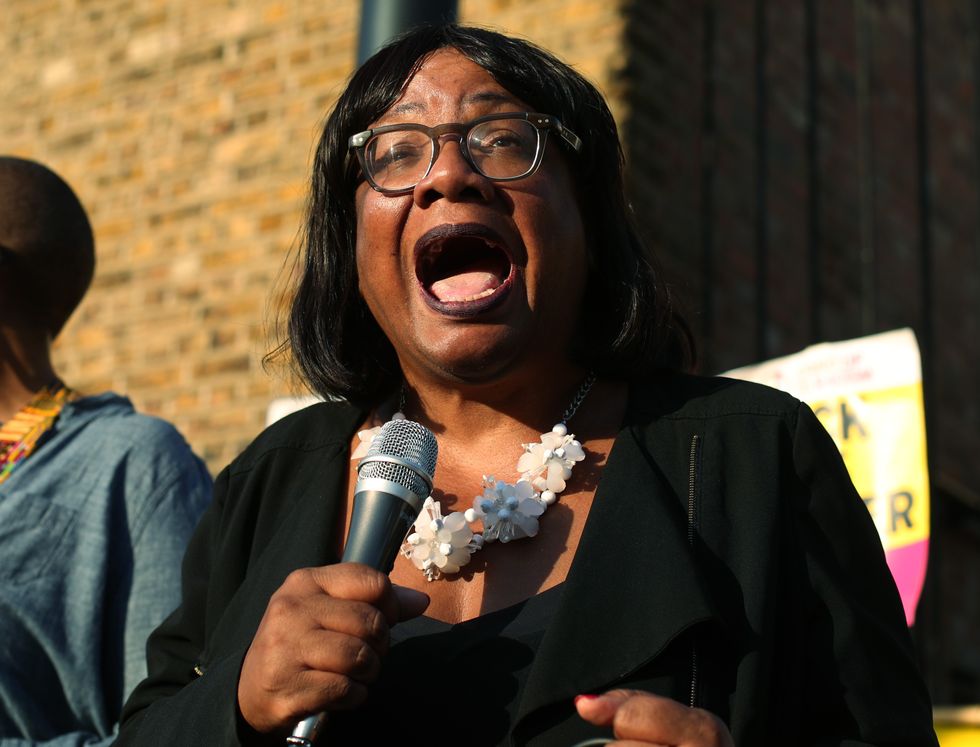
Diane Abbott
PADiane Abbott has been suspended from the Labour Party, GB News understands.
The Labour Party's ex-Shadow Home Secretary had been suspended "pending an investigation".
A YouGov poll has revealed that 57 per cent of Britons believe 16 and 17-year-olds should not be allowed to vote in general elections.
The survey, which included responses from 5,500 people, showed that 37 per cent supported the change — a move expected to take place before the next general election.
Anthony Wells of YouGov said: "We can't say with confidence how 16 and 17-year-olds would vote, because the polling evidence is quite scant.
"What we can say is that they probably won't have much impact, just because of raw numbers. Based on the most recent estimates, 16 and 17-year-olds make up about 2.8% of the 16+ UK population.
"If their turnout rate is anything like that of other young people, they'll be a substantially lower proportion of the actual electorate, perhaps half that."
 Details of more than 100 Britons were involved in the data leak
GETTY
Details of more than 100 Britons were involved in the data leak
GETTY
The details of more than 100 Britons including spies and special forces were included in a huge data leak that resulted in thousands of Afghans being secretly relocated to the UK, it has been revealed.
Defence sources have said that details of MI6 spies, SAS and special forces personnel were included in the spreadsheet, after they had endorsed Afghans who had applied to be brought to the UK.
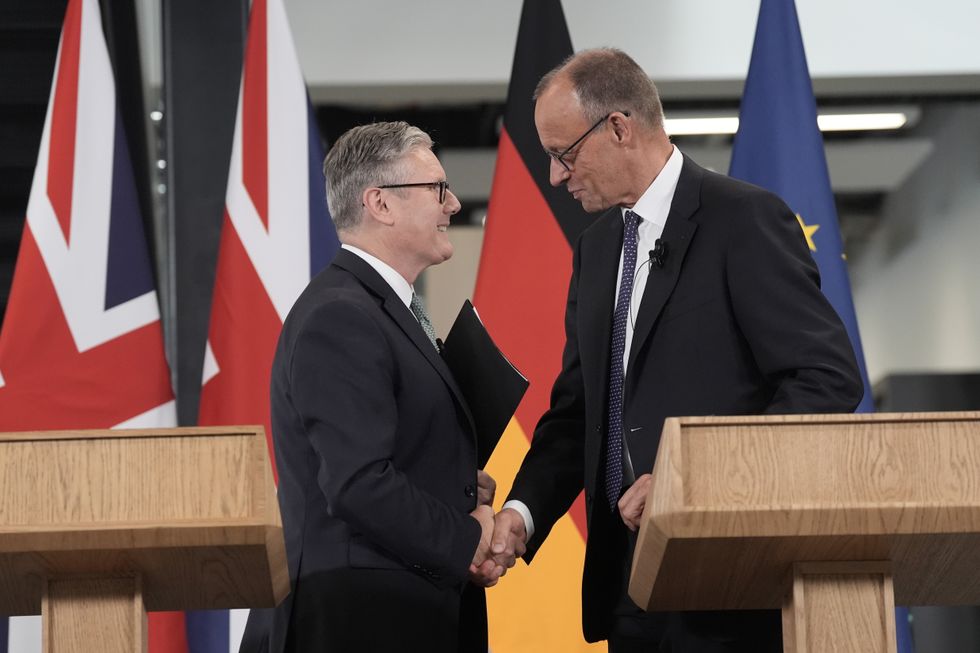
Prime Minister Sir Keir Starmer and German Chancellor Friedrich Merz shake hands
PA
The Prime Minister described the treaty as an “historic document which really measures just how close our countries are and our ambition for the future”.
He continued: “I’m really pleased that both our countries’ close relationship and your and my strong and close relationship at a time of real volatility in the world is really important to both our countries.”
German Chancellor Friedrich Merz said he had been “surprised” to learn it was the first UK-Germany treaty since the Second World War.
“We had you in the European Union and we thought that was enough,” he said. “But we are now learning that it’s not enough so we have to do more on that.”
Friedrich Merz told a press conference that UK, France, and Germany are aligning on key policy issues, including migration and security.
The German Chancellor noted that Germany and France are connected by the Élysée Treaty, while France and the UK are linked through the Lancaster House Treaty.
He said: “It is no coincidence that I happen to be here a week after the state visit of the French president to London, Emmanuel Macron. I will host Emmanuel Macron next week in Berlin, and in autumn we will have the Franco-German Council of Ministers in France.
“I’ve given those dates because they demonstrate that the E3 Great Britain, France and Germany are converging in their positions on foreign policy, on security policy, on migration policy, but also on economic policy issues.
“However, this dynamic is never exclusive in nature. We’re always bearing in mind Poland, Italy and the other also smaller European partners in whatever decision we take.”
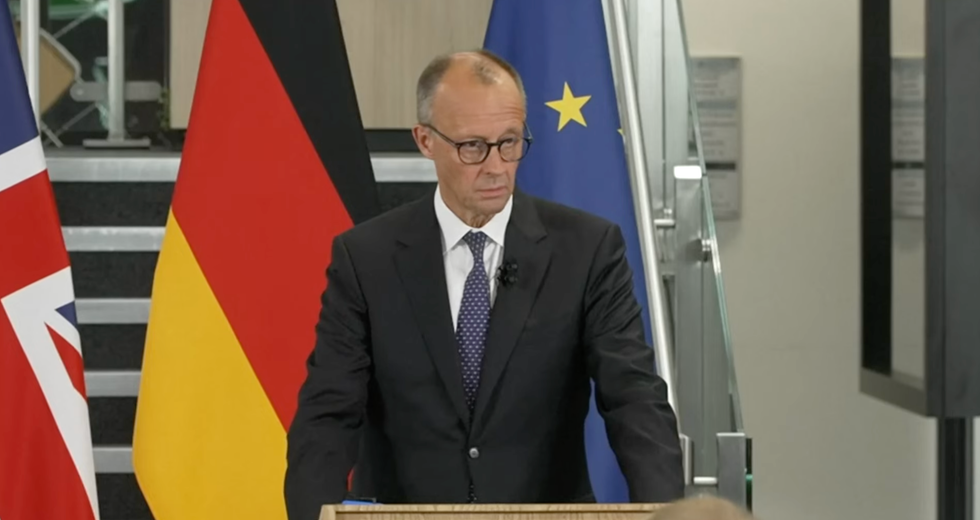
Friedrich Merz
GB News
The German Chancellor expressed his personal regret over Britain’s departure from the European Union.
Friedrich Merz said: “It is together that we respond to the major challenges of our time… the UK, and I personally deplore this deeply, decided to leave the European Union.”
Merz emphasised that security is the central theme of the treaty and reaffirmed Nato's commitment to mutual defence in the event of an attack.
He went on to say that, "Russia is shaking the European Security Architecture and the transatlantic ties are undergoing a far reaching transformation like we have not seen for a very long time" and in light of these developments, both the UK and Germany are striving to “secure the freedom and prosperity” of their citizens.
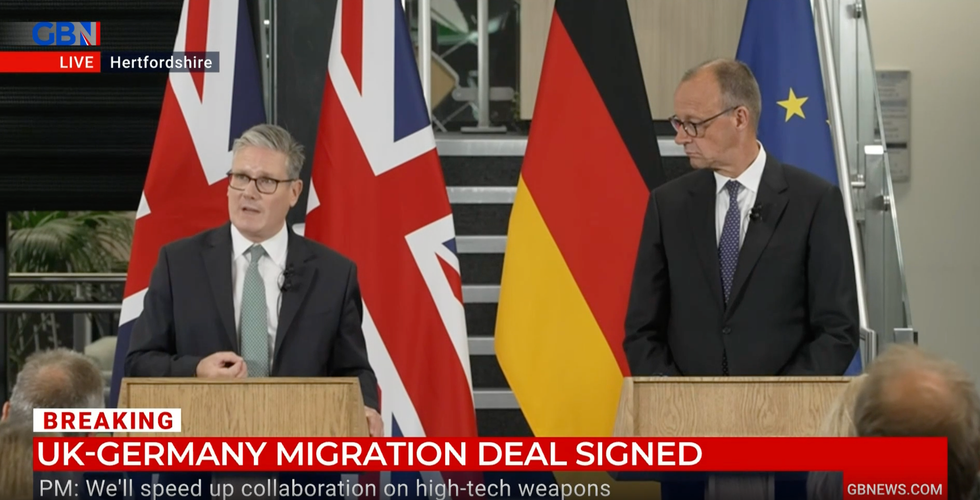
Sir Keir Starmer and German Chancellor Friedrich Merz
GB NEWS
Sir Keir Starmer said Britain is "working together" with Germany to crack down on illegal migration.
The Prime Minister thanked German Chancellor, Friedrich Merz, for his action on the issue as a UK-Germany Migration deal was signed this afternoon.
"I want to thank Friedrich for his action on this, pledging decisive action to strengthen German law this law so that small boats being stored or transported in Germany can be seized, disrupting the route to the UK, Starmer said.
"[It] is a clear sign that we mean business. We are coming after the criminal gangs in every way that we can."
Starmer went on to say the two leaders had discussed the "appalling situation in Gaza" and were working to support efforts towards a ceasefire.
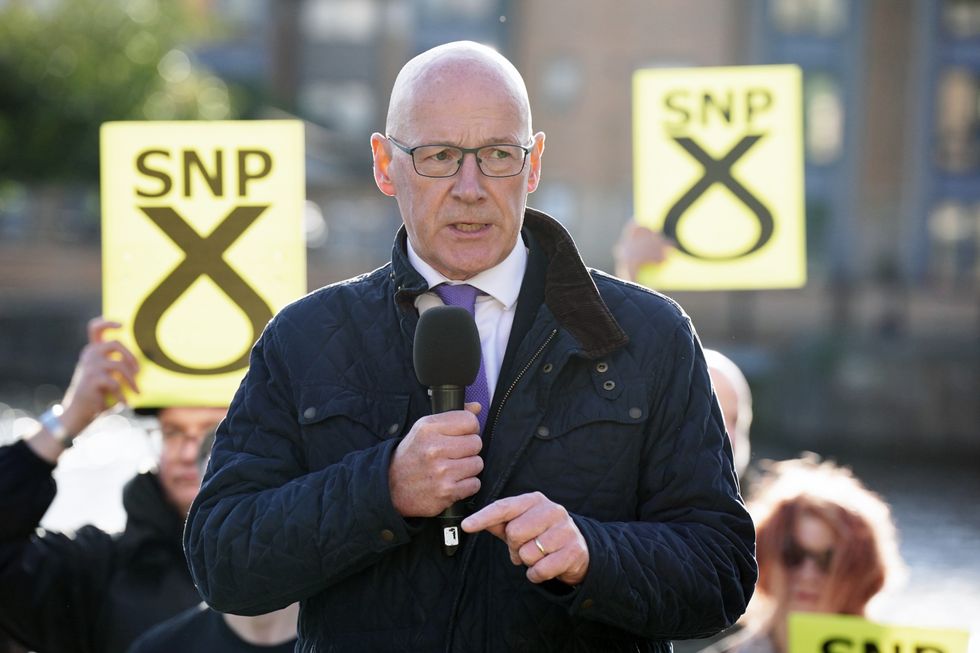
First Minister John Swinney said the UK is 'finally catching up'
PAAllowing 16 and 17-year-olds to vote in general elections is “long overdue”, First Minister John Swinney has said.
The Scottish National Party leader welcomed plans announced on Thursday, July 17, by the UK Labour Government to lower the voting age.
The change, which will come into force for the next Westminster election, comes several years after Holyrood lowered the voting age – a move Mr Swinney said had “made Scotland’s democracy stronger”.
Those aged 16 and 17 were allowed to vote in the Scottish independence referendum in 2014 and legislation passed by MSPs the following year allowed them to also vote in Scottish Parliament and council elections north of the border.
"Young people here have a stake in shaping our future and it made Scotland’s democracy stronger, Swinney wrote to X.
“The UK is finally catching up – this change is long overdue.”
Former armed forces minister James Heappey said the Ministry of Defence (MoD) "let the country down badly" in relation to the personal data leak of Afghans who supported British Forces.
Heappey was in the minister role when the super-injunction was granted which prevented the information from being reported the public.
In a post to social media, the former Conservative MP said: “A great deal happened during my 4 years as MinAF (minister for the armed forces) – war in Ukraine, UN mission to Mali, Covid-19, evacuations from Kabul & Khartoum, the Queens’s death, the Coronation and much more.
“MoD was magnificent in response to it all. But on this breach we let the country down badly.”
Thousands of Afghans are poised to sue the MoD after details of the mass data leak finally came to light this week.
Almost 20,000 names of people who had applied to seek shelter from the Taliban in Britain had their names leaked by a MoD official.
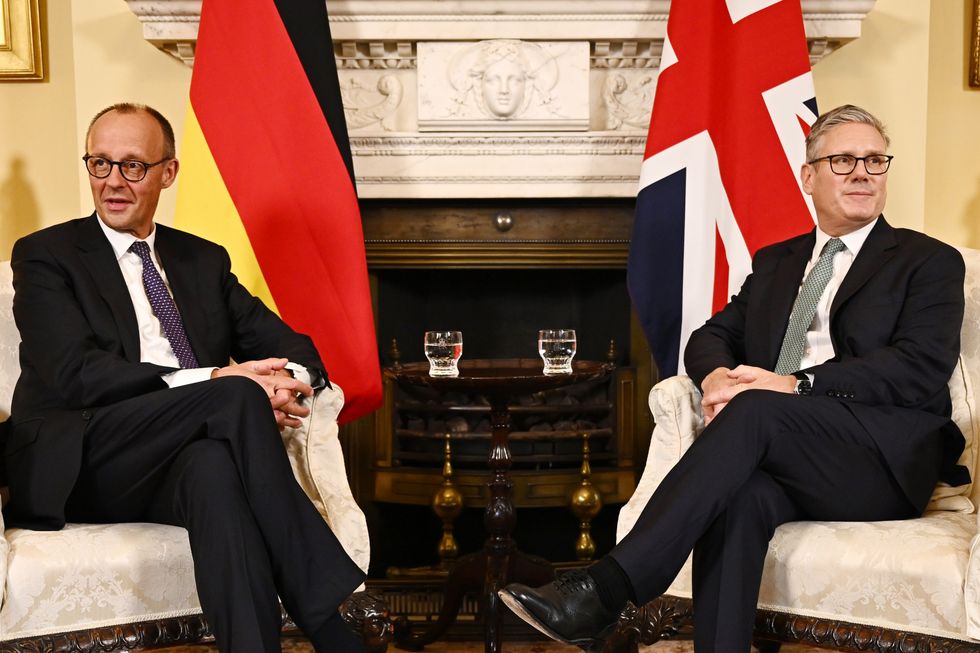
Prime Minister Sir Keir Starmer (right) with German Chancellor Friedrich Merz, in Downing Street
PA
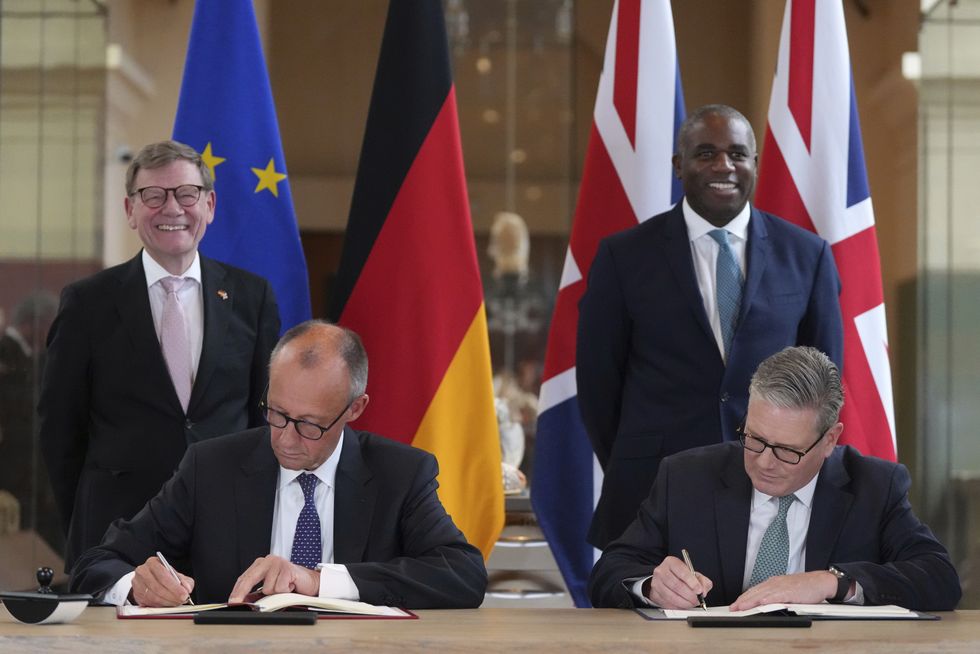
Prime Minister Sir Keir Starmer (front right) and German Chancellor Friedrich Merz (front left), watched by Germany's Minister for Foreign Affairs Johann Wadephul and Foreign Secretary David Lammy as they sign the new UK-Germany treaty in London
Frank Augstein/PA
Sir Keir Starmer, following the signing of today's UK-German agreement, said; "It's a privilege to have you here today, particularly to sign this Kensington Treaty, which is a very special treaty, because it's the first of its kind ever, if you can believe it, between our two countries."
He also labelled it "evidence of the closeness of our relationship as it stands today" and a "statement of intent, a statement of our ambition to work ever more closely together".
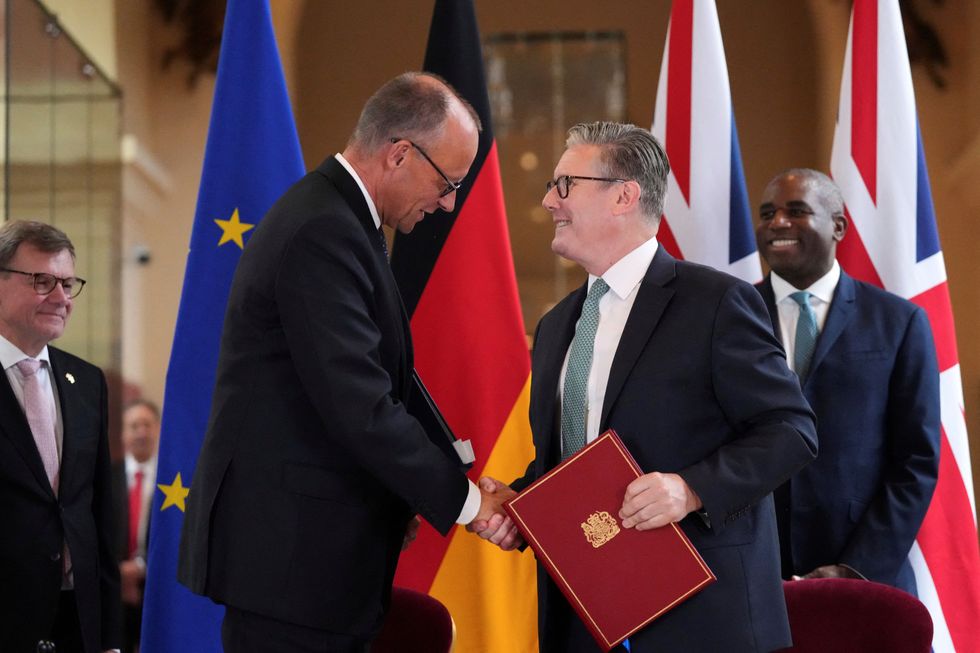
PICTURED: Keir Starmer and Germany's Friedrich Merz shake hands as they attend a signing ceremony of a wide-ranging bilateral cooperation treaty
REUTERS
Sir Keir Starmer and German counterpart Friedrich Merz were seen grinning today as Britain and Germany signed off on a major bilateral cooperation treaty.
The treaty includes a pledge to jointly produce defence exports such as Boxer armoured vehicles and Typhoon jets.
It will also commit to developing a "deep precision strike" missile in the next decade, with a range of more than 2,000 kilometres.
Elsewhere, the agreement includes plans to set up a new UK-Germany Business Forum.
Former Home Secretary James Cleverly has accused Labour of affording 16 and 17 year olds the right to vote because they are "tanking in the polls".
"The cynicism is breathtaking," he said. "Labour dropped it from the King's Speech after getting a big majority without it. Now they're tanking in the polls, they announce it again."
He also questioned whether Labour was saying "children should have the right to vote... or... 16 years olds are no longer children".
Either answer, he said, "opens a can of worms with regards to other rights and responsibilities for 16 and 17 year olds".
Ex-Tory Minister Simon Clarke has questioned Labour's age voting change, declaring it was "shameless gerrymandering".
"If we don't think 16 is the age of adult maturity, why is the Government doing this?," he said.
Clarke also pointed to polling by More in Common last May which showed voters tended to oppose proposals to change the voting age.
The Liberal Democrats have claimed Labour has left an "Elon Musk-shaped hole" in its voting reforms after it handed the right to 16-year-olds.
Ed Davey's party has declared the Government must close the door to foreign oligarchs "meddling" with British politics.
The Liberal Democrats also took credit for the age change, saying they had been campaigning to allow 16- and 17-year-olds to vote "for well over 20 years" - which the party's Cabinet Office spokeswoman Sarah Olney labelled a "no-brainer".
But she added: "There appears to be an Elon Musk-shaped hole in the Government's proposed changes to elections.
"Ministers must go much further to close the door to foreign oligarchs interfering in British politics - anything less undermines our democracy."
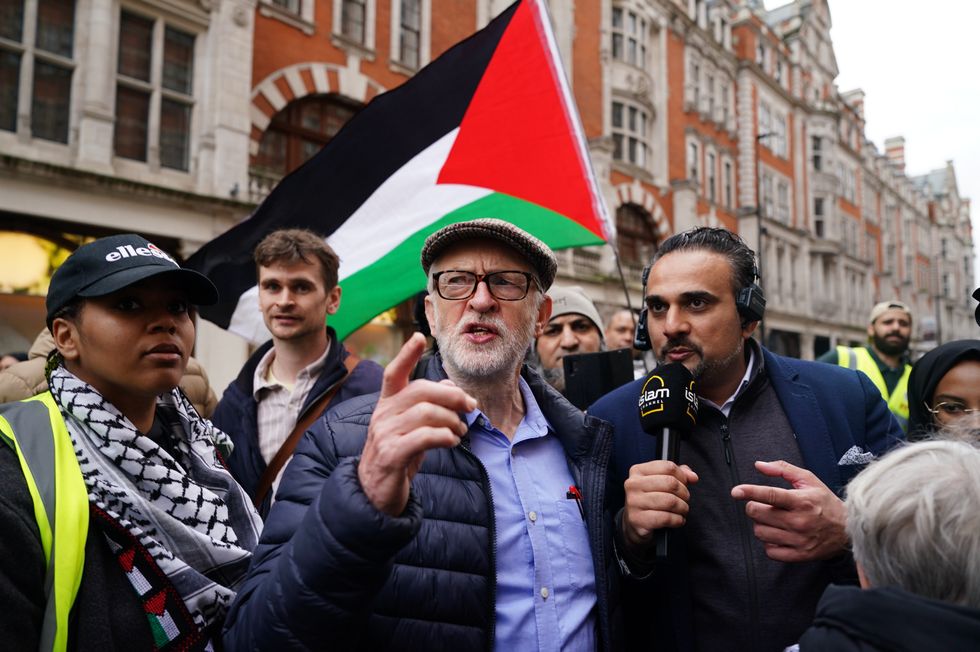
Jeremy Corbyn is at the top of the list for young voters
PADisgraced ex-Labour leader Jeremy Corbyn is at the top of the list for young voters asked which politicians and other public figures they approved of the most.
It comes as Keir Starmer took 39 per cent of the vote when asked who would make the best prime minister of the main party leaders.
Nigel Farage took 26 per cent while Kemi Badenoch was at 18 per cent and Ed Davey was at 16 per cent.
But, when they were presented a list of politicians and other influential public figures, 12 per cent said they "strongly approve" of Corbyn - ahead of both Starmer and Farage on nine per cent each.
It comes after a fresh poll found that Corbyn's potential new party would draw level with Labour at a General Election.
New data from Find Out Now revealed that the upstart party would take home 15 per cent of the vote, the same share as Labour.
Prime Minister Keir Starmer said the 16 and 17 year olds who will be given the vote in the next general election should be allowed to vote as they are made to pay tax if they are employed.
He told ITV News it was "really important" the new voting bloc "have the vote, because they are old enough to go out to work" and pay taxes.
"I think if you pay in, you should have the opportunity to say what you want your money spent on," he said.
"So I'm really pleased we are able to bring more young people into our democracy and give them a chance to have a say over how their taxes are paid and what they are going to be used for."
The Tories have accused Sir Keir Starmer of giving "no opportunity for parliamentary scrutiny" as MPs are due to break shortly for summer recess until September.
Shadow Communities Minister Paul Holmes told the House of Commons: "Instead of the democracy minister using this democratic chamber to announce a wide ranging strategy on democracy, the Government chose to announce it to the press in the Monday no 10 lobby briefing," he said.
He added that it was "typical of government by press release".
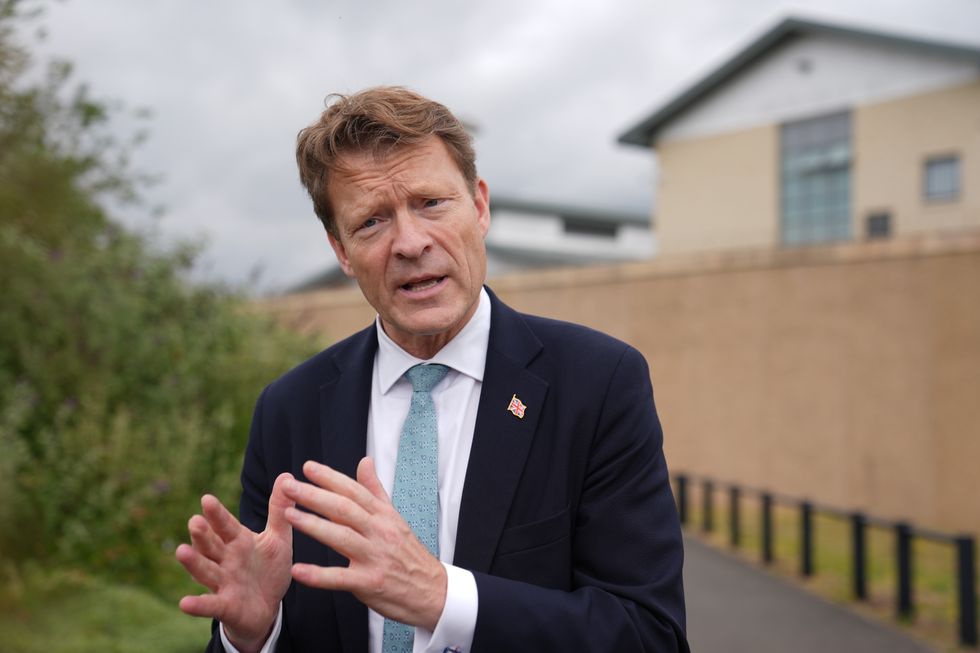
Deputy Reform leader Richard Tice
PADeputy Reform UK leader Richard Tice has said it is "totally wrong" for Labour to hand the vote to 16 and 17 year olds.
Speaking to the Telegraph, he said: "Totally wrong that children, by legal definition, should be allowed to vote whilst almost all still in school or college".
In the move to lower the voting age to 16, Deputy Prime Minister Angela Rayner said: "For too long public trust in our democracy has been damaged and faith in our institutions has been allowed to decline.
"We are taking action to break down barriers to participation that will ensure more people have the opportunity to engage in UK democracy, supporting our Plan for Change, and delivering on our manifesto commitment to give sixteen year olds the right to vote," she said.
"We cannot take our democracy for granted, and by protecting our elections from abuse and boosting participation we will strengthen the foundations of our society for the future."
Tory frontbencher Alex Burghart has issued a dire warning over public unrest in light of the Afghan leak scandal which saw a secret asylum scheme made public.
Ministers earlier this week feared riots would break out in Britain after the settlement scheme was brought to light.
Speaking at an event hosted by think tank Onward this morning, Burghart warned that Labour sees breakouts of public disorder like that seen in Northern Ireland and across the country last summer as "aberrations, freak events".
"I'm not sure that that is true anymore," he warned, but added: "I hope that that is the case."
Last month, I promised workers at Jaguar Land Rover that I would protect their jobs.
— Keir Starmer (@Keir_Starmer) May 8, 2025
I kept that promise. pic.twitter.com/floVEClyMW
Just weeks after the Prime Minister promised Jaguar Land Rover workers that he would "protect their jobs", JLR has today announced that 500 roles in the UK are on the chopping block.
In a statement on Thursday morning, just weeks after Keir Starmer said "I kept that promise", JLR confirmed it would be slashing 500 jobs from its UK operations.
Shadow Chancellor Mel Stride has blamed the government's "Jobs Tax" for the "persistently rising unemployment".
"Labour promised not to raise taxes on working people but they did," Stride posted on X.
"Under Labour we have seen unemployment rise, taxes hiked, inflation almost double and growth stagnate."
He added that Chancellor Rachel Reeves had refused to "rule out further tax rises" as autumn nears in a bid to pay for "Labour's costly U-turns".
"Labour isn't working and the British people are paying the price," he said.
With the latest workforce figures showing the the Labour market is continuing to weaken along with higher unemployment and slowing wage growth, Liberal Democrat Treasury spokesperson Daisy Cooper said "we can't go on with such a sluggish economy".
"The Government must go for growth by reversing the jobs tax which is stifling small businesses and rip up the red tape holding back British businesses from trading with the rest of Europe," she added.
"Only then will the Government unlock billions of pounds to protect public services and support struggling families."
Cooper said it was time, "after years of economic mismanagement" at the hands of the Conservatives, for the government and Chancellor Rachel Reeves to focus "on getting our economy back on track".
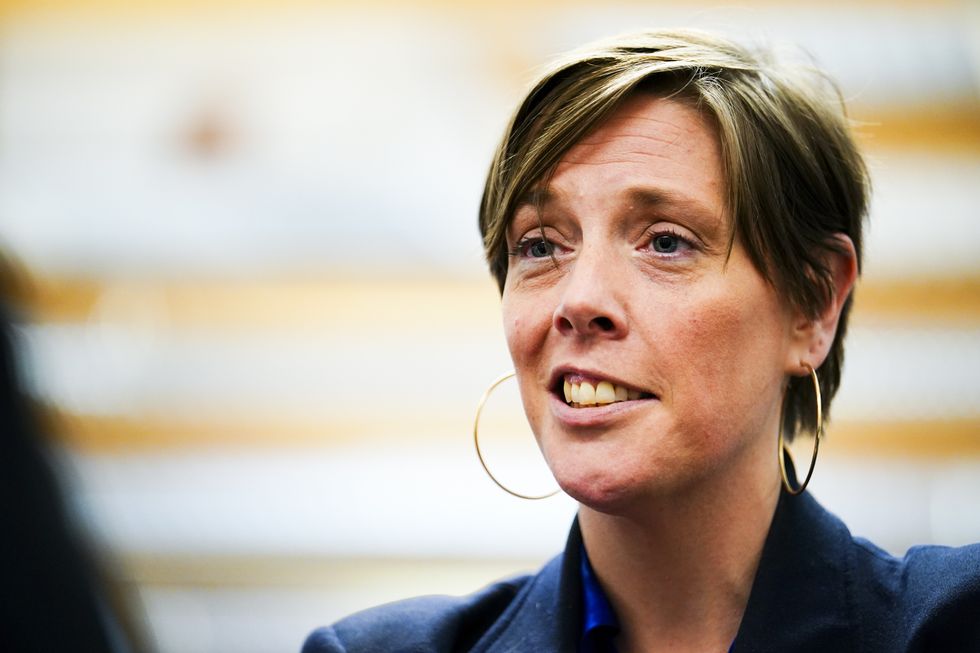
Jess Phillips
PASafeguarding Minister Jess Phillips has thrown her support behind the Prime Minister after he decided to suspend four MPs from the Labour Party.
While he is facing criticism from within his own party, Phillips told Sky News "if you persistently breach behaviours ... the chief whip will eventually be left with very little place to go".
She said MPs should "have to seek to work together", despite claims the rebels were sticking to their Labour values.
"If you are acting in a manner that is to undermine the ability of the government to deliver those things, I don't know what to expect," Phillips added.
The minister did admit she had been forced to "rebel and vote against", but noted MPs "continually causing trouble" went against the need to work together.
Diane Abbott declared she has no regrets regarding comments on racism which ultimately led her to being suspended by the Labour Party.
She was suspended by the party in 2023 after a writing a letter to the Observer comparing racism experienced by people of colour with that seen by other groups.
She told BBC Radio 4’s Reflections programme that she did not look back on the incident with regret.
Abbott was reinstated to the party before the 2024 general election and said: “Clearly, there must be a difference between racism which is about colour and other types of racism because you can see a Traveller or a Jewish person walking down the street (and) you don’t know."
“I just think that it’s silly to try and claim that racism which is about skin colour is the same as other types of racism," she said.
“I don’t know why people would say that.”
She apologised for any anguish her remarks caused which drew criticism from Jewish and Travellers groups.
Abbott is the longest-serving female MP in the parliament after entering in 1987 and she said she got a "bit weary" about people labelling her anti-semitic, adding she had "spent a lifetime fighting racism of all kinds".
She said while she was “grateful” to be a Labour MP she believed leadership had been “trying to get me out”.
Official figures from the Office for National Statistics have shown that unemployment has climbed to a four-year high of 4.7 per cent in the three months to May.
Shadow Work and Pensions Secretary Helen Whately said the worst "is yet to come under the punishing Labour Government".
“Unemployment going up for the ninth month in a row on Labour's watch is a disgrace," she said.
“It is the latest in a litany of dreadful economic news – coming off the back of stoked inflation and depressed growth stats. These are more than just statistics, each and every job loss is a devastating blow to hardworking families across the country."
Whately said it was a "shock, but not a surprise".
"(As) record taxes already biting, the employment rights bill looming and the prospect of even more painful tax rises to come in the autumn," she said.
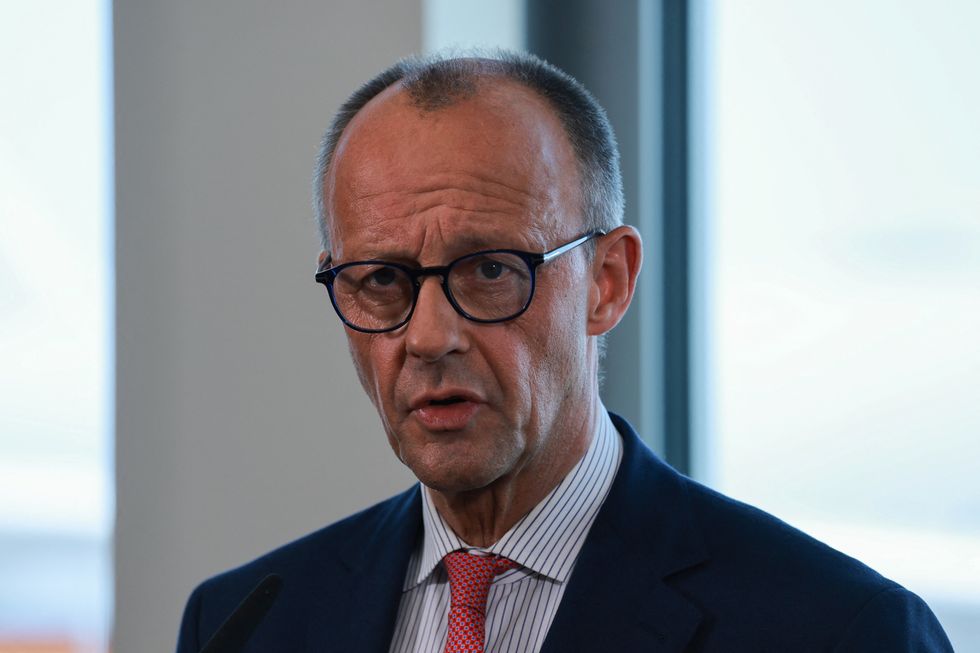 German Chancellor Friedrich Merz
REUTERS
German Chancellor Friedrich Merz
REUTERS
Prime Minister Keir Starmer will welcome German Chancellor Friedrich Merz today with their pair to strengthen relations by reportedly signing a wide-ranging bilateral cooperation treaty.
It could include language on mutual defence - first announced in August 2024 - following talks between Starmer and then-German Chancellor Olaf Scholz.
The treaty would seek commitment to make it illegal to facilitate illegal migration to the UK from within Germany.
Law change is expected in Germany which will make it easier to clamp down on people smuggling gangs in the country.
This Liveblog has now been closed.